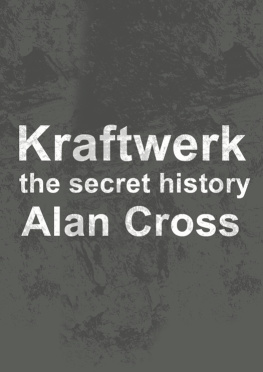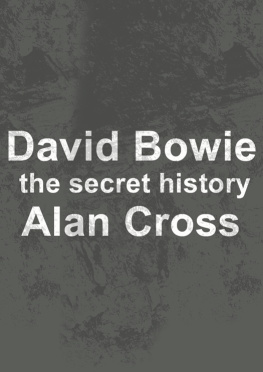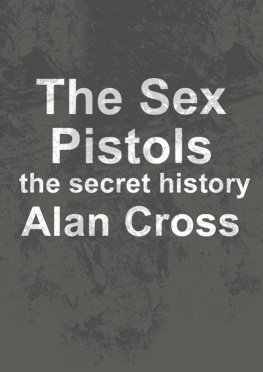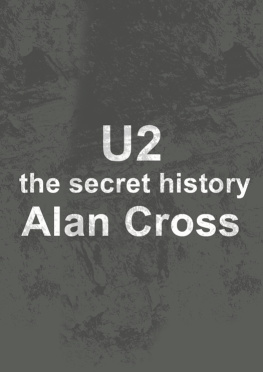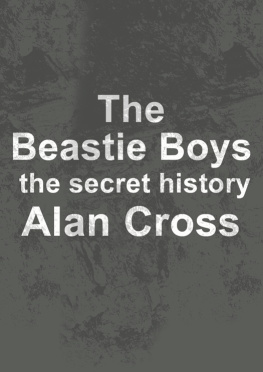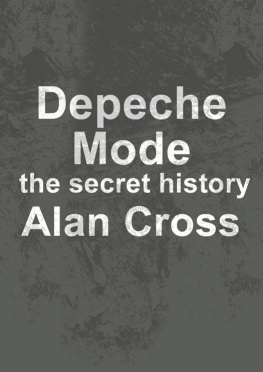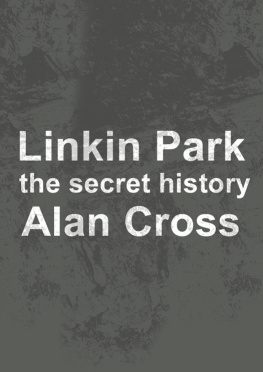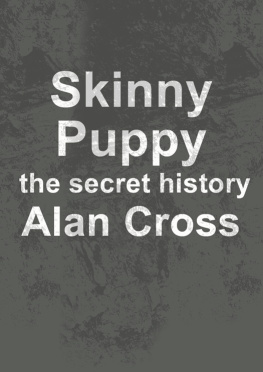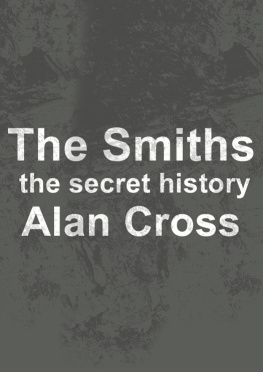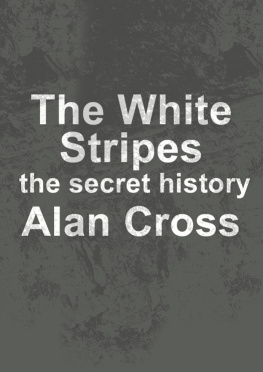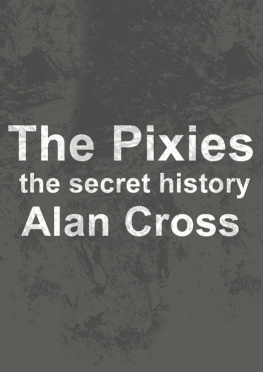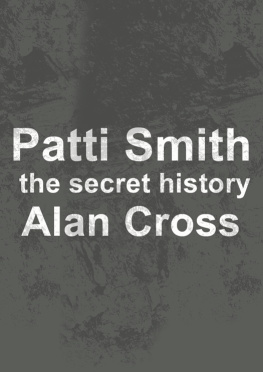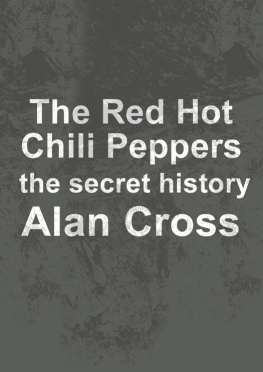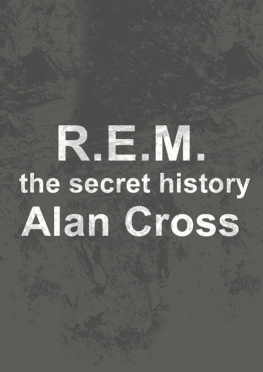Alan Cross - Kraftwerk: the secret history
Here you can read online Alan Cross - Kraftwerk: the secret history full text of the book (entire story) in english for free. Download pdf and epub, get meaning, cover and reviews about this ebook. year: 2012, publisher: HarperCollins Canada, genre: Romance novel. Description of the work, (preface) as well as reviews are available. Best literature library LitArk.com created for fans of good reading and offers a wide selection of genres:
Romance novel
Science fiction
Adventure
Detective
Science
History
Home and family
Prose
Art
Politics
Computer
Non-fiction
Religion
Business
Children
Humor
Choose a favorite category and find really read worthwhile books. Enjoy immersion in the world of imagination, feel the emotions of the characters or learn something new for yourself, make an fascinating discovery.
- Book:Kraftwerk: the secret history
- Author:
- Publisher:HarperCollins Canada
- Genre:
- Year:2012
- Rating:3 / 5
- Favourites:Add to favourites
- Your mark:
- 60
- 1
- 2
- 3
- 4
- 5
Kraftwerk: the secret history: summary, description and annotation
We offer to read an annotation, description, summary or preface (depends on what the author of the book "Kraftwerk: the secret history" wrote himself). If you haven't found the necessary information about the book — write in the comments, we will try to find it.
Alan Cross is the preeminent chronicler of popular music.
Here he provides a history of Kraftwerk, the worlds most famous sound chemists.
The Man Machines is adapted from the audiobook of the same name.
Kraftwerk: the secret history — read online for free the complete book (whole text) full work
Below is the text of the book, divided by pages. System saving the place of the last page read, allows you to conveniently read the book "Kraftwerk: the secret history" online for free, without having to search again every time where you left off. Put a bookmark, and you can go to the page where you finished reading at any time.
Font size:
Interval:
Bookmark:
On a nondescript street near the train station in the center of Dsseldorf, 24 Hochstrasse is a yellow building across from a Turkish grocery store. There is no sign on the door, nor will you find any formal reception area once you step inside. At first glance, the austere, low-key surroundings might make you think youve stumbled upon a high-security computer complex or perhaps a level four biological containment laboratory. Actually, its just a recording studio.
Although it has been there since 1971, it remains an extraordinarily mysterious place. Unlike other famous recording studios such as Abbey Road in London or Electric Ladyland in New York, Kling Klang is not available to anyone, no matter who they might be. In fact, only one group has ever used the place: the owners, Kraftwerk.
Welcome to the world of musics most famous klangchemikerssound chemistsmen dedicated to the pursuit of theartcraft known as gersamkunstwerk? Although Kraftwerk cant claim to have sold that many records over their 30-year existence (they havent), they could, if they chose to do so, boast of influencing the development of modern music on a dozen different levels. Their innovative use of electronics, computers and onstage imagery ultimately affected the course of everything from disco, house and hip-hop to pop, dance and industrial music. Had it not been for Kraftwerks relentless electronic pursuits, todays music would be much, much different.
Florian Schneider-Esleben was born on April 7, 1947, in a small town in the Bodensee area of what was then the southern part of West Germany. In 1950, the family moved to Dsseldorf, where his father, Paul, became a well-known architect, designing and rebuilding the airports and train stations that had been destroyed in the war. Ralf Htter was born on August 20, 1946, in Krefeld, a town northwest of Dsseldorf. The son of a doctor, he studied classical piano for a number of years before moving on to the electric organ at the Kunstakademie (Academy of Arts) in Remscheid, a city east of Dsseldorf. This is where he met Schneider, who was studying the flute. The two became friends and began exploring a common interest in avant-garde music.
One concern for many young German artists in the 50s and 60s was a loss of cultural identity. Caught between West and East in the cold war, German pop culture was increasingly Americanized. There was no real German scene or sound; local bands were content to perform covers by American or British artists while the visual arts (film, theater, etc.) were dominated by foreign content. This gave birth to a loosely knit movement of postwar artists who were determined to recapture, rebuild and advance a new cultural identity for their country.
As fans of Can and students of free-form improvisational jazz, Schneider and Htter were soon caught up in the possibilities of mating the avant-garde with rock and roll. In 1969, they attended a show at a Munich gallery that featured music created by several sine-wave oscillators. These were primitive and temperamental electronic devices that generated tones. By careful manipulation of voltage, it was possible to get something resembling a musical composition. At the very least, it was an interesting art statement.
Organisation was disbanded in early 1970. Schneider and Htter then formed Kraftwerk, using the German word for power plant. In the summer of that year, they recorded a debut album with Klaus Dinger and Andreas Hohman on drums and percussion. More structured, more melodic and more electronic than their first attempt, Kraftwerk (Philips, 1970) offered a blend of sounds that could be both soothing and disturbing, depending on the time of day, the volume and the mood of the listener. Ruckzuck (the opening trackGerman for do it quickly) would eventually became a favorite of the band when they played live.
Kraftwerk 2 sold a respectable 60,000 copies in Germany, although it might have sold more had the cover artwork (depicting an orange traffic cone) not been so similar to that of the first album. Sales were enough, however, to keep Kling Klang operational.
After some personnel shifts, Kraftwerk was temporarily put on hold. Reduced to a duo for the time being, Htter and Schneider (with important help and inspiration from artist-musician Emil Schult), issued Ralf and Florian (Philips) in November 1973. Although it was filled with austere synthesizer sounds, the fact that the album also featured woodwinds and strings disqualifies it from being a pure electronic record. Those who bought the record also received a bonus comic book.
Resurrecting the Kraftwerk name, Htter and Schneider decided to abandon the free-form, hit-and-miss approach of their first three albums. From now on, they decided, they would endeavor to make precise, exacting music. Discipline and structure replaced improvisation. Unlike contemporaries such as Tangerine Dream, they planned to employ a pop-song approach rather than a neo-classical or avant-garde jazz one. And to make sure that everything remained regimented and well-ordered, they would rely on machines. Investing in several Moog synthesizers and a sequencer (a device that could be programmed to produce long, repetitive sequences of notes endlessly and perfectly), they set about recording what would become a landmark album in the history of music. Hired to help with the album were Wolfgang Flr (born July 17, 1947) and Klaus Rder (birth date unknown).
The third Kraftwerk album was recorded at a time when the West German government was spending huge sums of money on a national highway building program. Not only did these wide, speed-limit-less freeways open the countryside to German city-dwellers, they made German drivers the envy of Europe. Seizing on this metaphor of the autobahn as freedom, everyone went for a ride in Htters Volkswagen. Few drivers and passers-by noticed the microphone hanging out the window. Returning to the studio, that drive down the autobahn became the basis of an all-electronic pop album.
Alternating between mesmerizing, minimalistic pop and cold, robotic, electronic sounds, Autobahn became a major hit on both sides of the Atlantic. The album contained an astonishing sonic landscape, featuring sounds and textures never before heard on a pop record. In the UK, the album peaked at number 4 and remained on the charts for 18 weeks. In America, the album hit number 5 on Billboard. A four-minute edit of the title track (necessary for a single release because the album version is close to 23 minutes long) climbed to number 6 in Britain and a respectable number 25 in the United States.
Autobahn was a major musical milestone not only for Kraftwerk but for music in general. In the early 70s, synthesizers were viewed as, at best, expensive electric curiosities. At worst, they were viewed as machines used by lazy or untalented people who couldnt be bothered to learn how to play a real instrument like a guitar or piano. Some went so far as to suggest that electronic music was a plot designed to prevent real musicians from making a living. Others insisted that the rise of the machine meant the death of music as we knew it.
To others, however, Kraftwerks mechanical, high-tech, disembodied approach to pop music was nothing less than a window on the future. Synthesizers, sequencers and drum machines represented a whole new universe of creative possibilities. The infinite tonal range of a synth pulse and guiding program of a sequencer (which removed the potential for human error) had unlimited potential. This technological and creative breakthrough immediately began to affect all music, from classical to dance to rock. In a few short years, an entire genre of music (dubbed techno-pop, electro-pop and electro-beat) would be born, rooted firmly in the premise of
Font size:
Interval:
Bookmark:
Similar books «Kraftwerk: the secret history»
Look at similar books to Kraftwerk: the secret history. We have selected literature similar in name and meaning in the hope of providing readers with more options to find new, interesting, not yet read works.
Discussion, reviews of the book Kraftwerk: the secret history and just readers' own opinions. Leave your comments, write what you think about the work, its meaning or the main characters. Specify what exactly you liked and what you didn't like, and why you think so.

